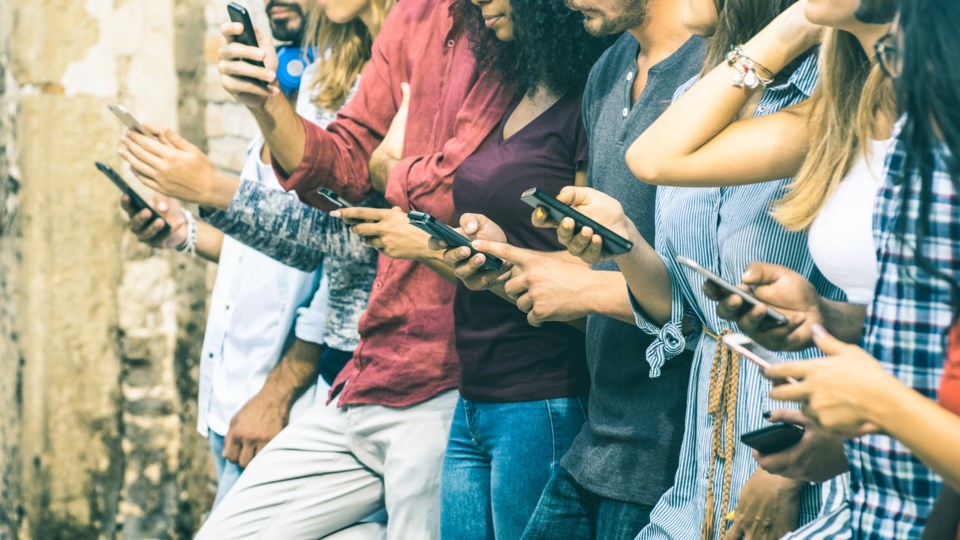How’s your attention span?
I’ve noticed mine getting shorter and shorter, especially when I try to read a book for any length of time. I feel a constant urge to check my phone every few minutes, and once I do, I’m lost down a rabbit hole of distraction.
Over the past few months, there have been several high-profile news articles in which former Silicon Valley employees express deep concerns about the addictive nature of sites such as Facebook and Google, including former Facebook president Sean Parker, who was widely reported to have said the program exploits “a vulnerability in human psychology.”
Those tactics exploit the reward centre of our brains, says brain expert Terry Small, who has been a public speaker about the brain for more than 30 years.
“That next text that comes in could be the big one. It’s very addicting and very rewarding — all these likes that you get and posts and responses,” Small said in an interview. “Sometimes all these little urgent things crowd out what’s important.”
Technology such as Facebook, Instagram, Twitter and Snapchat is personalized to specifically target each individual, to persuade them in various ways and to predict what will keep them online longer.
How do all of these distractions affect students? And particularly, how do they affect young people, for whom technology has always been a way of life?
“I think it has a profound effect and I’ve talked a lot to school teachers about this,” Small said.
Small refers to an article in the Atlantic by Jean Twenge, a professor of psychology at San Diego State University, which says that today’s teens, a generation she calls iGen, those born between 1995 and 2102, have completely changed from previous generations. Teens today are less likely to hang out with friends and more likely to stay home in their room, on their phones, Twenge’s research shows. They are less likely to date, to have sex, to get their drivers’ licence, and to drink alcohol or do drugs. However, they are more likely to experience loneliness, anxiety and depression, the article says. Twenge links all of this to the rise in smartphones.
And Small says the more time we spend cycling between tasks on our phones, the better our brains become at it.
“When it’s always on short cycles of attention — text, text, text, email, email, Instagram, Facebook — your brain becomes quite competent at partial continuous attention where your brain is always paying attention to multiple things, but never anything deeply,” Small said.
There are advantages to this partial continuous attention, like being able to multitask at work, but there are also disadvantages, Small cautions.
“When you get really good at something, it’s often at the expense of something else,” Small said. “In this case, the something else could be attention density, the ability to read deeply for long periods of time without the compulsion to check your phone every 60 seconds.”
So, what’s a mere human to do in the face of all this alluring, addicting technology?
Small says it’s all a matter of balance. He likes to go for a walk every day, purposefully leaving his phone at home. The exercise gets the blood flowing to the brain and the chance to daydream results in better memory and even new ideas.

“I go for a walk and I come back and my brain feels 10 years younger — I’ve been outdoors, I’ve been in nature and I didn’t have my phone with me,” Small said. “You’re actually giving your hippocampus a workout, keeping your memories alive and using your brain in a different way.”
Instead of multitasking, he tries to “task switch” every 20 minutes or so, which allows him to completely focus on one thing.
“Realize that multitasking will take a toll. Your productivity will probably drop, your focus will drop and you will be more tired at the end of the day,” Small said.
And just as the brain gets good at what it does repeatedly, it’s also possible to “sculpt” your brain, simply by practising what you want to get good at.
“Your brain is going to sculpt itself anyway, so you might as well get involved,” Small said.
On that note, it’s time for me to turn off my computer, put down my phone and head out for an uninterrupted walk in nature. Maybe when I get back I will be able to read a book.
Tracy Sherlock writes about education and social issues. She can be reached at [email protected].



